KDDI Bundle
Can KDDI Continue to Thrive in the Evolving Telecom Landscape?
KDDI Corporation, a telecom giant in Japan, is charting an ambitious course for growth, leveraging its 'KDDI VISION 2030' and the 'Satellite Growth Strategy'. This strategic shift, updated in May 2024, is all about expanding its connectivity power and integrating telecommunications with cutting-edge tech like AI. From its 2000 merger to its current status, KDDI has consistently adapted to market changes.
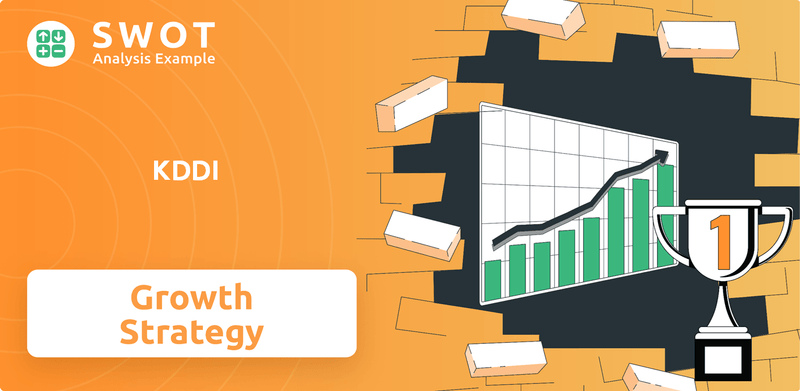
With a robust 5G network and a focus on digital transformation, KDDI is poised to capitalize on emerging opportunities. The company's proactive approach to innovation and strategic planning, as highlighted in a detailed KDDI SWOT Analysis, positions it well within the competitive Japanese telecom market. Its expansion into areas like DX, finance, and LX demonstrates a forward-thinking business model, crucial for navigating telecom industry trends and securing future growth.
How Is KDDI Expanding Its Reach?
The expansion initiatives of the company are primarily driven by its 'Satellite Growth Strategy,' focusing on entering new markets and diversifying its business portfolio. This strategy is crucial for understanding the overall KDDI growth strategy and its future prospects in the Japanese telecom market.
A key aspect of this strategy is the expansion of its 5G network. The company is actively increasing its Sub6 band 5G coverage, making faster, larger-capacity 5G available to a wider customer base. These initiatives are part of a broader effort to adapt to changing consumer behavior and maintain a competitive edge in the telecom industry trends.
The company's expansion plans in 2024 include significant investments in infrastructure and strategic partnerships to strengthen its position in the market. These moves are aimed at enhancing its mobile and fixed-line services and driving innovation in the IoT space.
By March 2024, the company had completed 94,000 5G base stations. Plans are in place to reach 100,000 base stations by FY 2030. The Sub6 band 5G coverage expanded significantly, with a 2.8-fold increase in Kanto and a 1.5-fold increase nationwide between April and May 2024.
A capital and business partnership agreement was entered into with Lawson, Inc., in February 2024. In October 2024, the company and Samsung announced an expansion of their Open RAN deployment starting in 2025. In May 2024, SoftBank and the company agreed to explore expanding their joint 5G network building initiative through their joint venture, 5G JAPAN Corporation.
The company's expansion strategy focuses on network infrastructure, strategic partnerships, and international growth. These initiatives are designed to enhance customer experience and drive revenue growth. The company is also committed to sustainability initiatives and goals, integrating environmental considerations into its business operations.
- 5G Network Deployment: Reaching 100,000 base stations by FY 2030.
- Partnerships: Collaborations with Lawson, Inc., Samsung, and SoftBank to enhance services and infrastructure.
- International Expansion: Acquisition of data centers in Canada for CAD 1.35 billion.
- Digital Transformation: Renewing 'au Smart Pass' as 'Ponta Pass' to expand its telecommunications and economic zone.
KDDI SWOT Analysis
- Complete SWOT Breakdown
- Fully Customizable
- Editable in Excel & Word
- Professional Formatting
- Investor-Ready Format
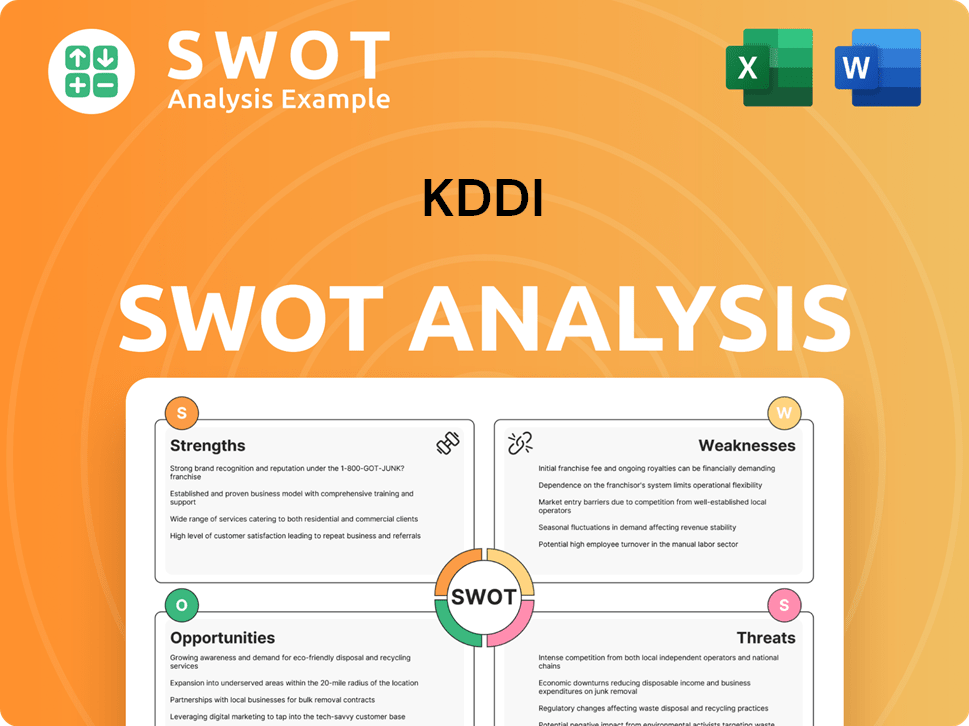
How Does KDDI Invest in Innovation?
KDDI's innovation and technology strategy is central to its 'Satellite Growth Strategy' and 'KDDI VISION 2030,' focusing on advanced technologies to fuel growth and create new value. The company is heavily investing in 5G communications, data-driven practices, and generative AI. This approach is designed to meet evolving customer needs and preferences in the dynamic Japanese telecom market.
The company’s commitment to digital transformation (DX) is another key aspect, aiming to provide value-added services in DX, finance, and energy. This strategy is a response to changing consumer behavior and aims to enhance customer experiences through technological advancements. KDDI's approach is also shaped by regulatory changes within the telecom industry, requiring continuous adaptation and innovation.
KDDI's strategy is also influenced by the need to maintain a competitive edge. Understanding and responding to customer needs, leveraging technology, and forming strategic partnerships are crucial for KDDI's future prospects and its ability to thrive in the Japanese telecom market. The company's focus on innovation in the IoT space further enhances its competitive advantages.
By March 2024, KDDI had completed 94,000 5G base stations, a critical element of its growth initiatives. The company is deploying Sub6 bands for faster, larger-capacity 5G, with coverage expanding significantly in early 2024. This expansion is a key part of KDDI's 5G network deployment strategy.
KDDI is investing heavily in AI, with plans to invest up to JPY 100 billion ($649 million) over the next four years for generative AI R&D. Up to JPY 10 billion of this investment may come from government support. This investment demonstrates KDDI's commitment to innovation and its role in the Japanese economy.
KDDI is developing 'WAKONX,' a new business platform for the AI era, with the goal of implementing AI across all functions. This platform aims to address industry issues in mobility, retail, and logistics, showcasing KDDI's digital transformation strategy.
KDDI plans to establish edge infrastructure across Japan to support its AI initiatives. This infrastructure will be crucial for enabling real-time data processing and supporting the company's innovation in the IoT space.
KDDI is accelerating business growth by providing value-added services in DX, finance, and energy. Its collaboration with Lawson, Inc., for retail-tech initiatives, with experimental labs opening in 'TAKANAWA GATEWAY CITY' by spring 2025, highlights KDDI's partnerships and collaborations.
IoT connections grew to 46.33 million as of September 2024. This growth underscores KDDI's focus on the IoT space and its ability to adapt to changing consumer behavior. This data is essential for a comprehensive KDDI company analysis.
KDDI is expanding its Open RAN deployment starting in 2025, in collaboration with Samsung, to enhance energy efficiency and optimize performance. The company is also working with DriveNets to deploy its Network Cloud solution in backbone core routers, aiming for commercial operations by the end of 2025, to build a flexible network architecture. Furthermore, KDDI is recognized for its sustainability initiatives, having recycled over 99% of its disused network hardware in 2023, showcasing its commitment to sustainability initiatives and goals.
- In Q2 2024, KDDI filed 25 patents in connectivity, focusing on improving communication services.
- KDDI's approach includes embracing cloud computing and Network Function Virtualization (NFV) to reduce carbon emissions and optimize energy use.
- These initiatives are part of KDDI's response to regulatory changes and its overall KDDI growth strategy.
- For more insights into KDDI's competitive landscape, consider reading about the Competitors Landscape of KDDI.
KDDI PESTLE Analysis
- Covers All 6 PESTLE Categories
- No Research Needed – Save Hours of Work
- Built by Experts, Trusted by Consultants
- Instant Download, Ready to Use
- 100% Editable, Fully Customizable
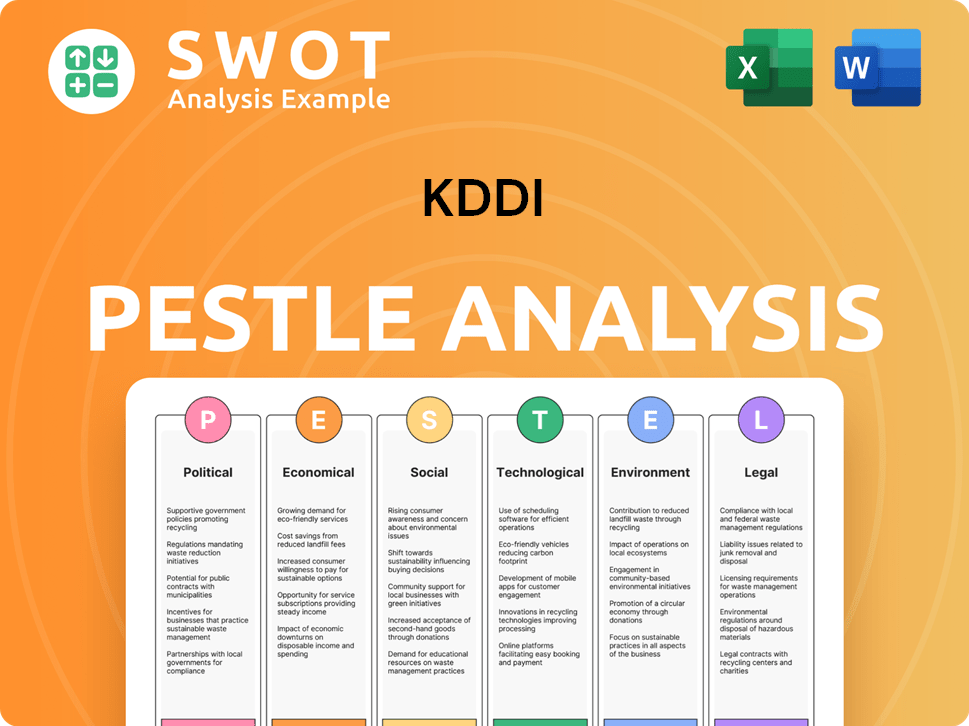
What Is KDDI’s Growth Forecast?
The financial outlook for KDDI Corporation reflects a strategic focus on sustained growth, driven by its 'Satellite Growth Strategy' and a commitment to enhance shareholder value. The company's performance in the fiscal year ending March 2024 demonstrated resilience, with revenue and operating income increases. This positive trajectory is expected to continue, supported by strategic investments and a strong emphasis on financial returns.
KDDI's business services segment is a key driver of its growth, particularly in areas like IoT and data centers. The company's expansion plans, including its 5G network deployment strategy, are designed to capitalize on evolving market trends in the Japanese telecom market. This approach is complemented by a robust financial strategy that includes dividend increases and share repurchases, underscoring KDDI's confidence in its future prospects.
KDDI's financial performance and outlook are closely tied to its ability to adapt to changing consumer behavior and leverage its competitive advantages in Japan. The company's investment in new technologies and digital transformation strategy are critical components of its long-term success. Furthermore, KDDI's sustainability initiatives and partnerships play a significant role in its overall business model.
For the fiscal year ending March 2024, KDDI reported a 1.5% increase in revenue, reaching ¥5.754 trillion. Operating income was ¥961.6 billion, and net income attributable to owners of the parent was ¥637.9 billion. The business services segment saw a 13.1% revenue increase in the six months ending September 30, 2024, driven by IoT and data center growth.
Data center operating revenue reached ¥65 billion, marking a 12.1% year-on-year increase as of September 2024. This growth highlights the importance of data centers in KDDI's overall strategy and reflects the increasing demand for these services. The company is strategically investing in this area to support future growth.
For the fiscal year ending March 31, 2025, KDDI forecasts operating revenue of ¥5,770 billion and operating income of ¥1,510 billion. Profit for the year is projected to be ¥690 billion. These projections indicate continued growth and strategic financial management. This outlook supports the company's Marketing Strategy of KDDI.
For the fiscal year ending March 2026, KDDI projects operating revenue of ¥6,330 billion (up 7.0% year-on-year), operating income of ¥1,178 billion (up 5.3% year-on-year), and profit for the year of ¥748 billion (up 9.1% year-on-year). The company aims to achieve a 1.5 times increase in EPS by FY March 2026 compared to FY March 2019, with a target EPS of ¥194.38.
KDDI is committed to enhancing shareholder value through consistent dividend increases and strategic share repurchases. The company's focus on shareholder returns is a key element of its financial strategy, reflecting its confidence in future performance and its commitment to providing value to investors.
- Target DPS of ¥80 for FY March 2026, marking 24 consecutive years of dividend growth.
- Payout ratio is just over 40%.
- Announced a two-for-one stock split.
- Share repurchase plan totaling ¥400 billion.
- Resolution to cancel treasury shares over 5% of the total issued shares.
- Aims for operating cash flow of ¥3 trillion over two years, allocating funds for CapEx, strategic business investment, and shareholder returns.
KDDI Business Model Canvas
- Complete 9-Block Business Model Canvas
- Effortlessly Communicate Your Business Strategy
- Investor-Ready BMC Format
- 100% Editable and Customizable
- Clear and Structured Layout
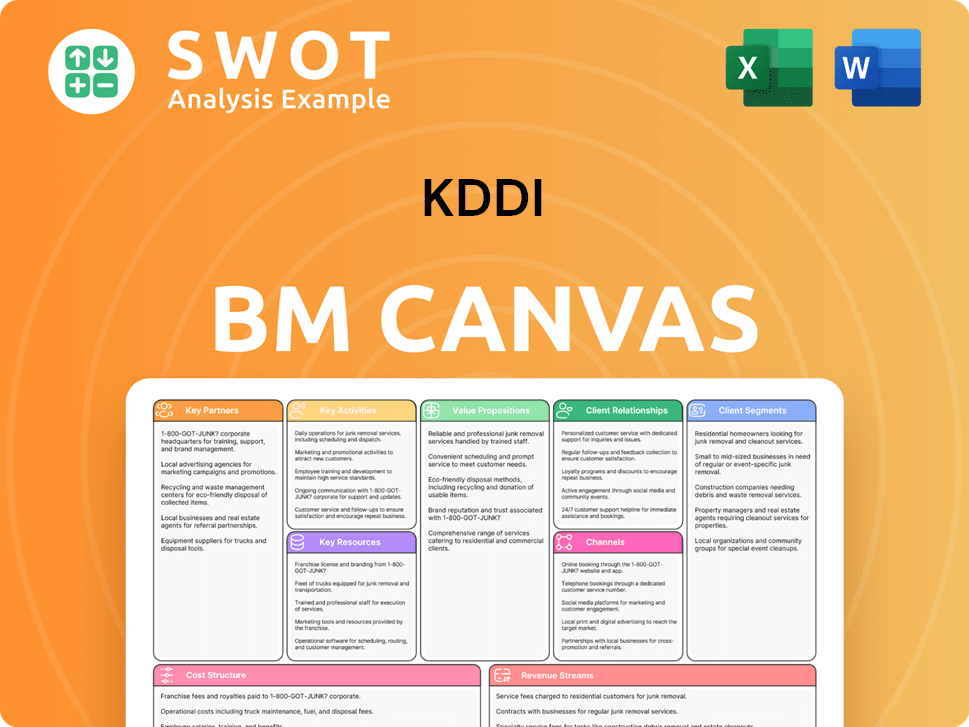
What Risks Could Slow KDDI’s Growth?
The path of KDDI's growth strategy and its future prospects is not without potential risks and obstacles. The Japanese telecom market, a key area for KDDI, faces challenges from intense competition and evolving consumer preferences. Understanding these risks is critical for a comprehensive KDDI company analysis.
Market dynamics, regulatory changes, and technological disruptions pose significant threats to KDDI's operations and financial performance. The company must navigate these challenges effectively to sustain its growth trajectory. This requires a proactive approach to risk management and strategic adaptation.
Competitive pressures are a major concern for KDDI. The entry of new players and the increasing popularity of budget smartphones can lead to customer churn. Furthermore, price cuts in the communications sector, driven by competition, could negatively impact earnings. The evolving telecom industry trends require continuous adaptation.
KDDI faces competition from established players and new entrants like Rakuten Mobile. Intensified competition can lead to lower prices and reduced market share. This competitive landscape requires KDDI to continually innovate and improve its service offerings.
Government intervention in pricing and other regulatory changes can impact KDDI's revenue and profit margins. Compliance costs and the need to adapt to new regulations are ongoing challenges. KDDI must stay informed and adapt to regulatory shifts.
Rapid technological advancements, particularly in areas like AI and new network architectures, present both opportunities and risks. KDDI's investments in these areas must be strategic and well-executed. The company must also compete with hyperscalers in AI infrastructure.
Reliance on global hardware and software suppliers makes KDDI vulnerable to supply chain disruptions. These disruptions can impact the deployment of new technologies and services. Diversifying suppliers and building resilient supply chains are key.
Data leaks and hacking attempts are a persistent threat that can undermine trust and damage the brand. Robust cybersecurity measures are essential to protect customer data and maintain reputation. Continuous monitoring and proactive security measures are crucial.
Significant capital expenditures for AI-ready data centers and GPU-as-a-service offerings pose financial risks. Securing anchor tenants and building a partner ecosystem are vital for managing these risks. Careful financial planning and risk assessment are essential.
To mitigate these risks, KDDI employs a multi-pronged approach. Diversification into 'Life Design' services, partnerships, cost efficiency measures, and strategic investments in new technologies are all part of the strategy. For instance, KDDI has been expanding its services beyond traditional mobile telecommunications to reduce reliance on a single revenue stream, a key aspect of its KDDI business model. The company also focuses on cost efficiency and has absorbed impacts from factors like fuel price hikes through strong performance in focus areas and cost-saving efforts. For more insights into the company's history, you can read Brief History of KDDI. Further, KDDI's emphasis on strengthening its management base through initiatives like human resources, carbon neutrality, and group governance is also crucial.
KDDI continues to focus on expanding its 5G network deployment, which is a key part of its KDDI's 5G network deployment strategy. The company's financial performance and outlook are closely tied to the success of these initiatives. KDDI's investments in new technologies are designed to drive growth and adapt to changing consumer behavior.
KDDI leverages its existing infrastructure and partnerships to maintain a competitive edge in the Japanese telecom market. Strategic collaborations, such as those for 5G network development, enhance its market position. KDDI's customer acquisition and retention strategies are also crucial for its success.
KDDI Porter's Five Forces Analysis
- Covers All 5 Competitive Forces in Detail
- Structured for Consultants, Students, and Founders
- 100% Editable in Microsoft Word & Excel
- Instant Digital Download – Use Immediately
- Compatible with Mac & PC – Fully Unlocked
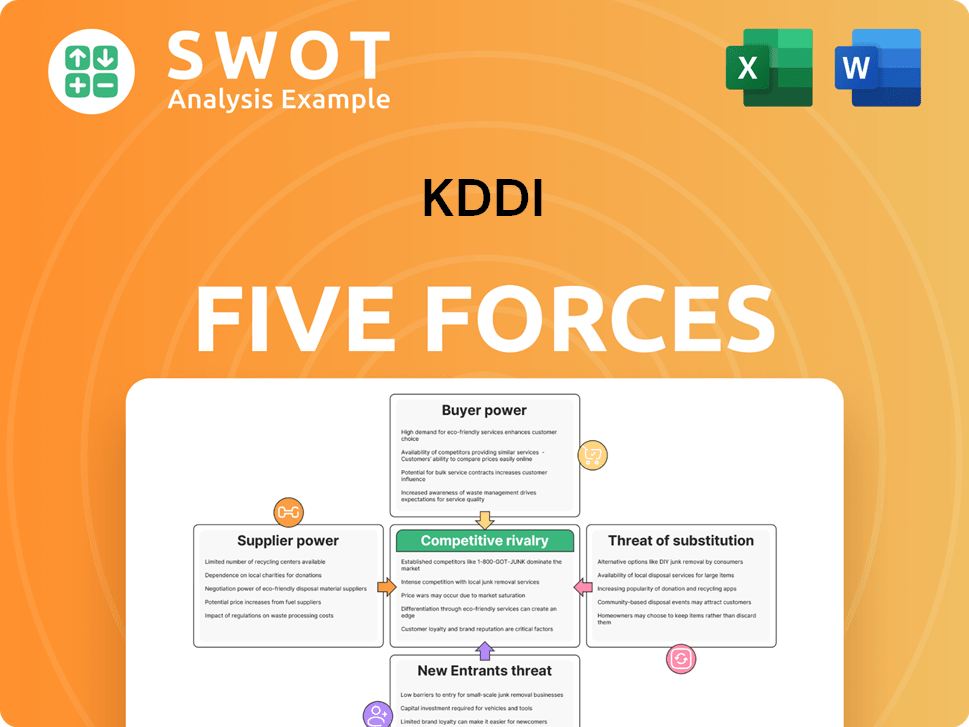
Related Blogs
- What are Mission Vision & Core Values of KDDI Company?
- What is Competitive Landscape of KDDI Company?
- How Does KDDI Company Work?
- What is Sales and Marketing Strategy of KDDI Company?
- What is Brief History of KDDI Company?
- Who Owns KDDI Company?
- What is Customer Demographics and Target Market of KDDI Company?
Disclaimer
All information, articles, and product details provided on this website are for general informational and educational purposes only. We do not claim any ownership over, nor do we intend to infringe upon, any trademarks, copyrights, logos, brand names, or other intellectual property mentioned or depicted on this site. Such intellectual property remains the property of its respective owners, and any references here are made solely for identification or informational purposes, without implying any affiliation, endorsement, or partnership.
We make no representations or warranties, express or implied, regarding the accuracy, completeness, or suitability of any content or products presented. Nothing on this website should be construed as legal, tax, investment, financial, medical, or other professional advice. In addition, no part of this site—including articles or product references—constitutes a solicitation, recommendation, endorsement, advertisement, or offer to buy or sell any securities, franchises, or other financial instruments, particularly in jurisdictions where such activity would be unlawful.
All content is of a general nature and may not address the specific circumstances of any individual or entity. It is not a substitute for professional advice or services. Any actions you take based on the information provided here are strictly at your own risk. You accept full responsibility for any decisions or outcomes arising from your use of this website and agree to release us from any liability in connection with your use of, or reliance upon, the content or products found herein.